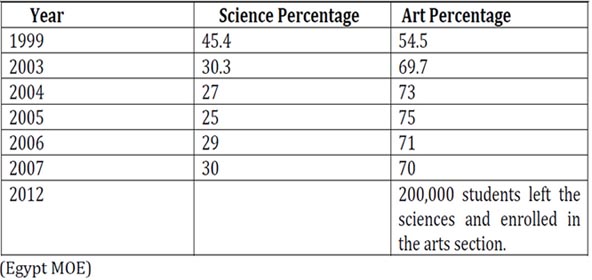Implementing School Science Clubs in Egypt
As part of a multifaceted technical assistance project in Egypt, AIR has partnered with Intel and Egypt’s Ministry of Education (MOE) to implement science clubs in schools. The initiative promotes scientific inquiry among students in grades 5 through 9, and engages them in original science projects and research. To date, AIR has worked with local ministry representatives and school boards of trustees to establish 70 science clubs in nine governorates across Egypt, serving about 1,600 students. AIR has trained 174 teachers from various branches of science to facilitate the club activities.
–Student from Science Clubs, Giza governorate
The science club initiative is part of AIR’s aim to support and improve the Egyptian MOE’s provision of educational services for the country’s children during a critical time. While Egyptian society is going through a complex transition toward democratization and reform, education in general – specifically, the quality of educational services – is affected by the instability.
One manifestation of this can be seen by the ongoing decline in the number of students enrolled in the science section of secondary schools, which had already begun before the Arab Spring. Parents began to compensate for what was happening with the reduction of quality instruction in the schools by supplementing their children’s education with tutoring. The cost of tutoring for math and sciences was much higher than for the arts and humanities, and the grades needed for admission to universities in the former subject areas had to be far more competitive than in the latter (Rissmann-Joyce, S., & El Nagdi, M., 2013). Beginning in the year 2000, enrollment figures show stark contrast with previous years (Egypt Ministry of Education, 2012). The following figure below, taken from MOE reports, underscore this pattern.
Figure: Proportion of Students Enrolling in Science and Arts Sections of Egypt’s Secondary Schools  Source: Rissmann-Joyce, S., and El Nagdi, M. (2013, March). A case study – Egypt’s first STEM Schools: Lessons Learned. Kuala Lumpur: Proceeding of the Global Summit on Education.
Source: Rissmann-Joyce, S., and El Nagdi, M. (2013, March). A case study – Egypt’s first STEM Schools: Lessons Learned. Kuala Lumpur: Proceeding of the Global Summit on Education.
The AIR-Intel science club activities seek to reverse the trend of students moving away from the math and sciences in Egyptian schools. The partners believe that strength in the math and sciences are critical for the economic progress and innovation of Egyptian society. As such, the AIR-Intel partnership supports students through the:
- Introduction of scientific inquiry skills;
- Implementation of a research or practical project that responds to a community problem; and,
- Participation in competitions and fairs.
AIR adopts a community-led approach that promotes building partnerships among public, private and civil society actors to support the implementation of these science clubs. The Boards of Trustees in each school community play a crucial role in assisting these clubs by linking students with universities, research centers, and experts in the fields of their projects to provide additional mentorship and support. Furthermore, AIR’s school-level interventions with the students through these clubs will complement Intel’s International Science and Engineering Fairs (ISEF) by providing a chance for students to compete in these fairs with their original projects and research.